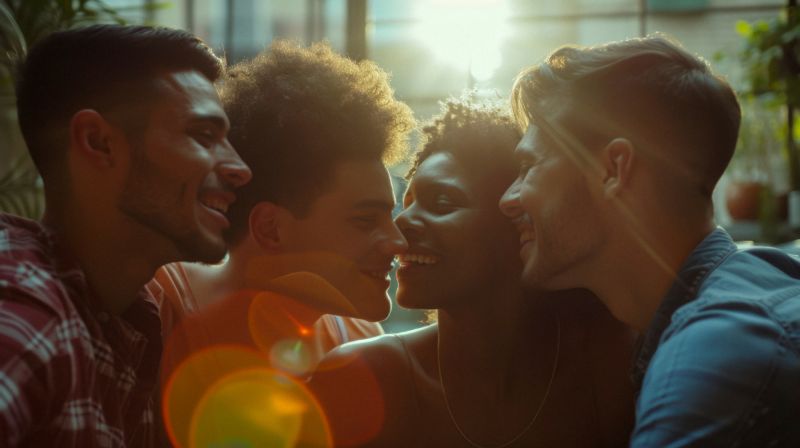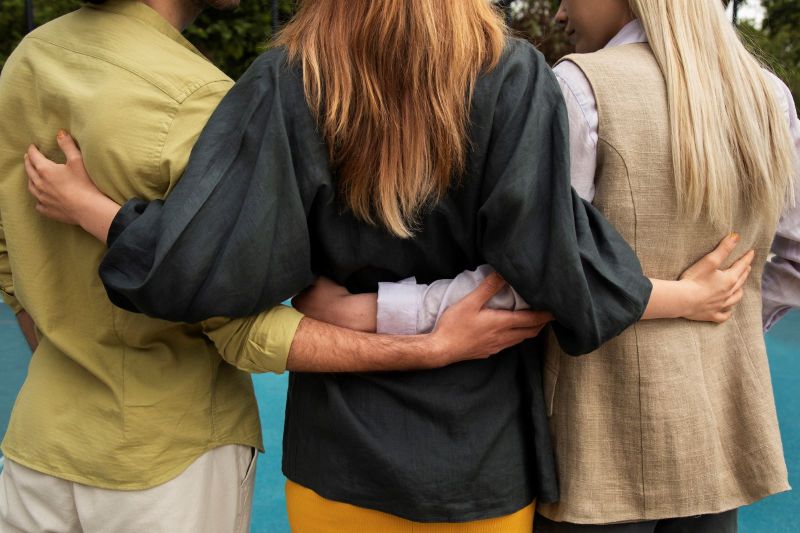What is Relationship Anarchy and How Does it Work?
What does it mean to be a relationship anarchist? In 2024, we’re moving away from traditional views of what healthy, happy, and long-lasting relationships should look like.
Do you find yourself and your desires constrained by heteronormative, monogamous, and other traditional ideas about relationships?
Relationship anarchists are throwing the romantic rule book out the window and designing relationships based on individual needs and values, not what society dictates is right for us.

What is relationship anarchy? Customize your commitments
Relationship anarchy (sometimes abbreviated to RA) is a philosophy of values that encourages people to form personal relationships based on their own needs and what makes them feel good instead of traditional social expectations.From a young age, most of us are taught to believe a particular set of rules about relationships that we are encouraged to adhere to and shamed for going against.
These rules include valuing romantic relationships over others (friendship, family), monogamy, heteronormativity, and following a trajectory that includes meeting one person, moving in together, getting married, and having babies.
The relationship anarchist ‘manifesto’
The term relationship anarchy was first coined by Andie Nordgren, who wrote a 2006 Swedish pamphlet they went on to translate into English and publish on Tumblr.
This manifesto for relationship anarchy outlined its core components: love is not a limited resource, every relationship is unique, and relationships should be built on love and respect rather than entitlement.

What is relationship anarchy about? It is not all about having multiple partners.
It is about approaching all relationships—platonic, sexual, romantic, professional—in a nonhierarchical way free from societal pressure and viewing all connections as equally essential and deserving of your love and attention.
Relationship anarchy vs polyamory
While polyamory, which also centers on autonomy, can look similar to relationship anarchy, they are not the same thing.
Polyamory is a form of open relationship or ethical non monogamy where people can have multiple romantic or sexual partners at once. Poly relationships often have a hierarchy, with primary and secondary partners.
What’s the difference between relationship anarchy and polyamory? In relationship anarchy, people can have all kinds of relationships - intimate, sexual, friendship - with structures and dynamics they decide on themselves.
While polyamory refers to the structuring of sexual and romantic relationships, relationship anarchy is a philosophy that encompasses all the connections in your life.
A relationship anarchist can choose, for their own reasons, to have one partner or two or have multiple lovers without any labels or expectations.

Relationship anarchy: principles & values
Make your own rules
Anarchy is about a lack of rules. It’s about autonomy, self-determination, and forming relationships and dynamics based entirely on the needs, wants, and desires of the people involved.
The relationship anarchy philosophy encourages people not to go with the flow or fall into a relationship dynamic because someone else wants it or because society tells them to.
What is relationship anarchy about? Not being bound by what society believes relationships should be, but still ensuring everyone involved feels respected, happy, and listened to.
No hierarchies
In traditional monogamous relationships, your romantic partner is considered more important than others, whether friends, family, or lovers. These imposed hierarchies can lead to inauthentic behavior and stop relationships from progressing naturally.
In anarchist relationships, there is no externally forced hierarchy. If someone has more than one partner, everyone’s needs are considered equally and each person chooses and agrees upon what they can give and expect from one another.
Non-romantic relationships often take higher priority than traditional relationships. You might decide that it’s more important to you to devote time to your friendships than your romantic relationships.
If your partners share this point of view, the relationship can continue this way.

Honest communication
The foundation of relationship anarchy is authenticity. Being explicitly open and honest can feel uncomfortable at first. But relationship anarchy can’t work unless everyone involved takes the time to think about how they want relationships to function in their life and communicate that to those around them.
Express your agency and support your partner’s agency. Expressing jealousy if it arises is vital.
It’s also useful to discuss what concepts like partnership, commitment, marriage, cohabiting, casual relationships, and having children mean to you and your partner(s).
An abundance of love
Traditional relationship models assume there is not enough love to go around, so we must create hierarchies.
Relationship anarchy functions differently. What is relationship anarchy? At its core is the belief that love is not a finite resource. You can love multiple people, and this doesn’t have to detract from the love you feel for each of them individually.
Every new connection between the two people is a brand new creation and should be treated that way. There is no need to decide to give romantic love to one person at a time.
If you agree to call someone a partner or lover, that’s fine. If you choose not to assign labels to your relationships, that’s fine, too.

Anarchic relationships can look however you want them to look.
There is no set configuration or expectations when it comes to anarchic relationships. There is only open communication and people making their own decisions about how they want to live and love.
Like other relationship practices that sit outside the norm, relationship anarchy can be challenging at first.
But if it feels authentic, and everyone involved is aware, happy, and consenting, then anarchic relationships can be as beautiful and long-lasting as any other, if that’s what you want.









